- Home
- Lois Lowry
Taking Care of Terrific Page 6
Taking Care of Terrific Read online
Page 6
Tom Terrific sighed as the Swan Boat glided away under the bridge. Then he picked up a brown crayon, frowned at the blank page, and began to draw a huge Popsicle.
To this day I don't know exactly how Hawk and the bag lady managed to convince eighteen female derelicts of all ages, colors, and intelligence to gather at four o'clock the following day. "Powers of persuasion, man," he grinned when I asked him, drawing out the word "persuasion" like a sustained note on a saxophone.
"Come on, Hawk," I said suspiciously. "Tell me for real. Don't put me on."
He chuckled and sank down in the grass beside me, arranging his legs carefully, the way a spider might.
"You got to observe people," he said. "I mean study them, man. Scrutinize. You got to figure out what makes them tick."
"How can you figure out what makes bag ladies tick? They all tick differently."
"Riiiggghht. So you approach them all differently. See that one over there? The one with the straw hat and the gloves?"
I looked and nodded.
"I been coming here a long time. I been watching that chick with the straw hat a long time. She's mad."
"You mean crazy?"
"Nope. I mean mad, man. She's mad at the whole world. She's got a billion angries inside her head, hiding in that straw hat. You ought to see that mama kick rocks when she really feels the need to let loose."
"No kidding?"
"No kidding. So you approach her where her angries are. I told her, 'Lady, tomorrow we going to organize and we going to do in the sucker with the Popsicle cart. He's been taking advantage. Tomorrow we get him good.' Her eyes lit up like Christmas."
So did mine, listening to him. He went on. "There's another one—I don't see her right now—she has long hair down her back? Sometimes she has it tied with a string?"
I nodded. I'd seen the long-haired woman wandering around. "Is she mad, too?"
"Nope. She's suffering from a sadness so big inside her it's like a hog with the bloat. Full-blown deee-pression, man."
"What do you say to someone that sad?"
"I said, 'Madam, it won't change the anguished state of the universe any, but I'd like to invite you to a party at four tomorrow afternoon. A little music, a little cheer, a little action, a little celebration.'"
"And that worked?"
"Well, I'm not sure about that one. You can't win 'em all. She started to cry and walked away. But she may show, still. You can't tell."
"And you did that with all the bag ladies? You figured out what makes each one tick?"
He grinned and shuffled his feet back and forth in the grass. "Sounds good, don't it? Trouble is, it don't always work. That's why social workers throw up their hands, sometimes, and become computer programmers. You wanta know how I really did it?" He looked a little embarrassed.
"Yeah."
He chuckled. "Realism, man. That's the real power of persuasion. I offered a buck to each one who shows."
I started to laugh, but then I felt terrible. Most days Hawk went home with no more than a few dollars in his saxophone case. "Hawk," I said, "you shouldn't have. I'll pay, well, half if I can. I've got a little money saved up."
But he shook his head firmly and turned me down. "My treat. It cost me no more than a night on the town: a few beers, maybe a movie thrown in. And I haven't had so much fun in twenty years, man."
He unfolded his legs, stood up, and stretched. "Look," he said with a wide grin.
And there they were. It was four o'clock. Tom Terrific came running from the path, where he'd been playing with a puppy. "They came!" he cried in delight.
They had come: a bizarre crowd of mumbling, shuffling women wearing ragged coats and baggy sweaters, sandals and rain boots and knee socks and Supp-hose, flowered hats and hair ribbons and wigs. One of them was carrying a scroungy cat in a plastic shopping bag; its head poked out, and it surveyed the scene with crafty yellow eyes, but I could hear it purring.
Hawk came over to where Tom and I stood watching.
"Us three," he said, "had better stay here, I think."
"Don't we get to march?" asked Tom Terrific. He'd been practicing marching as we walked to the Public Garden from his house. HUP two three four; HUP two three four.
Hawk knelt so that he was level with Tom's four-year-old height. "We're the organizers, man," he explained. "But it's the bag ladies' war. We're going to stand right here to supervise. Your first job will be to hand out signs. Did you make enough?"
Enough? Tom Terrific and I had worked all the previous afternoon. I had taken them home in my backpack, and today we had taped them all to sticks. We could have outfitted the U.S. Army with signs that said BRING BACK ROOT BEER POP-SICLES. I pointed to the stack.
But Tom Terrific's lower lip was beginning to poke out ominously. His feet were moving in place: HUP two three four. Tom Terrific wanted to go to battle.
"Hang on," said the Hawk. "I forgot your badge." Quickly he took a marking pen and tore a scrap of paper from one of the last pages in my sketch pad.
HEAD HONCHO, he wrote, and he taped the badge to Tom's chest. Hawk told him what it said, and Tom's lower lip retreated. He smiled proudly and stuck his chest out like a marine's.
"Now," said Hawk, "I'll get them lined up. You hand out the signs. Then you give the marching orders, Head Honcho."
And Tom did. He did it terrifically. When every bag lady was armed with a sign and in a line—a straggly, uneven line, but a line nonetheless—he climbed on a bench and called in a booming voice, "Forward, MARCH!" By then we had already drawn quite a crowd of onlookers.
And they marched. Did they march! Weaving, shuffling, muttering, murmuring, the eighteen bag ladies—with a nineteenth, our bag lady, right at the head of the line—headed for the Popsicle cart. The man behind the cart looked up and grinned at first; then he read the signs. His grin disappeared.
On the street, a strange vehicle was passing. It was a replica of an old-fashioned trolley car that was used to take tourists around Boston for a sightseeing tour in the summer. In the front, a young man with a microphone was intoning in a bored voice, "On your left you will see Boston's famous Public Garden, established by the legislature in 1856, designed by Boston architect George Meachum..." His voice trailed off suddenly. Heads craned from the vehicle, watching the parade of bag ladies carrying their signs. "We'll stop for a minute, ladies and gentlemen," said the tour guide, his voice more interested now, "and see what's going on here."
Standing on his bench, Tom Terrific's feet were keeping time, HUP two three four, and his little chest was still thrust forward.
Behind him, Hawk had taken out his saxophone and was playing "When the Saints Go Marchin' In."
A huge crowd had gathered now. Their faces were amused, interested, enthusiastic, sympathetic, in sharp contrast to the ruddy face of the Popsicle man, which had looked at first amused, then puzzled, next angry, and finally had settled into a mask of despair.
One of the bystanders, a young man in a yellow sweatsuit, had noticed the remaining signs stacked beside me in the grass. "You mind?" he asked, reaching down. I shook my head; he picked up a sign, BRING BACK DADDY'S ROOT BEER, and joined the shuffling bag ladies who moved now in a wide circle around the Popsicle cart.
"Uh-oh," I said to myself when a mounted policeman trotted up on his horse to see what was going on. "Big trouble." But it wasn't. He frowned, leaned forward in his saddle to see what the signs said, and then smiled.
"My dad used to make root beer," he said to no one in particular as he patted the glistening neck of his horse.
An elderly, distinguished-looking man in a three-piece suit stood near me, with a pipe in his mouth. "It's not cricket to picket," he said in a British accent. Then, when he noticed me watching him, he explained, "That's Ogden Nash." He leaned over, picked up a sign, and joined the picket line.
People began to get their cameras out. Around me, I could hear wives say to their husbands, "Get a picture of the one with the cat in the sack!" "Quick, Harry!
Get a shot of that lady in the orange wig before she goes past!"
In the background, I could see the Swan Boats slow from their graceful glide until they were almost motionless on the pond. Everyone in the boats was watching the commotion.
It was all over very quickly. The red-faced man at the Popsicle cart began first to mutter, then to argue and complain; but finally, when the chant of the surrounding crowd—"Root beer, root beer, root beer"—grew louder and louder, he simply threw his hands into the air.
"You want root beer? So I'll give you root beer!" he shouted.
"When?" called the crowd; then that, too, became a chant. "When? When?"
"Tomorrow!" yelled the man, capitulating angrily.
The laughing policeman moved his horse through the crowd until he was in the midst of the circle of muttering, sign-wielding bag ladies and sympathizers.
"Let's break it up now, folks!" he called. "You've won your war!"
He turned to the Popsicle man. "Tomorrow," he said. "That was a promise."
The Popsicle man nodded grudgingly.
One by one the bag ladies and the others laid their signs in a stack on the grass. Gradually the crowd dispersed. The tourist trolley moved on; the Swan Boats began their silent glide across the pond again.
The bag ladies disappeared like shadows, moving singly away from the crowd and simply fading from sight as they shuffled off. Even our own bag lady was gone.
Hawk drew out the last note like a sigh and put his saxophone down. "They didn't collect their pay," he said in amazement.
Tom Terrific jumped down from his bench and asked happily, knowing the answer, "Was I a good Head Honcho?" and I assured him that he was the best.
I left the signs for Hawk, who said he would take them to his car. Then I HUP-two-three-foured Tom Terrific home.
It was a great feeling to win a war. I was beginning to think that it might be fun to start another.
Chapter 11
After something works out well, you want to talk about it to someone. During the school year, I spend half of every Saturday on the phone talking to Trina and Emily, my two best friends, about the school dances, plays, and concerts that are held on Friday nights. Or if nothing was held at school, we talk about whatever movie we went to the night before.
You just need to relive things, especially if they made you feel good. But there was no one I could talk to about the Great Root Beer Popsicle Strike.
The bag ladies had all dissolved like ghosts fading into the background of a late night movie.
Hawk? He had loped off, same as always, to his battered car, into which he loaded the signs and the saxophone. I had no idea where Hawk lived, where he went at night, who he went home to.
A statue of Edward Everett Hale stands there at the entrance to the Public Garden by the Popside cart, with his bronze overcoat draped around him in chiseled folds. He had watched the whole thing, but his mournful bronze eyes had never changed. Man of Letters he may have been—it says so at the base of his statue—but he sure wasn't much of a conversationalist.
Head Honcho Tom Terrific and I talked a bit on the way home; but let's face it, terrific though Tom was, he was only four. His main concern on the walk home was in getting his browns reorganized in the Crayola box and in bellowing out "HUP" every fourth step.
As for his mother, Ms. Cameron? By the time we reached the house on West Cedar Street, Tom Terrific had to change back to his Joshua self: sweet and cherubic, with his hair smoothed down. He affected great delight at the freshly squeezed orange juice his mother had ready, and I concocted a new set of reasons why we had not, again today, drawn pictures of trees.
"Hey, guess what we did this afternoon," I murmured to a poodle tied outside DeLuca's as I walked home. But the poodle yawned, then turned to chew on his own curly hip.
All of this is an explanation of why, later that evening, I called up Seth Sandroff. My parents (if I had tried to tell them about it, they would have begun immediately to fill out registration forms to send me to summer camp, boarding school, rafting trips on the Snake River, Outward Bound, a cloistered convent) had gone to the theater. Mrs. Kolodny was reading an old issue of Good Housekeeping in the kitchen while the dishwasher ran. She had forgotten to add the detergent, but I didn't tell her. I figured the high temperature would kill the germs.
I left her engrossed in an article, "How to Stay Cheerful During a Difficult Pregnancy," and curled up in the den with a Diet Pepsi and the telephone.
"You turkey," said Seth after I had described the afternoon, "why didn't you let me arrange for a camera crew? I could have had the whole spot shown on Heartwarmers tonight at seven-thirty."
Heartwarmers, need I add, is a wretched fifteen-minute TV thing dreamed up by Seth's father, guaranteed to make the audience either weep or barf. A hundred-year-old man with no living relatives celebrates his birthday all alone except for a three-legged dog. Blind triplets are taken to the circus for the first time. All of this is sponsored by a very crunchy cereal with no nutritional value.
"The viewing audience couldn't have stood it, Seth," I said. "It would have overwarmed their hearts."
"Don't underestimate the power of television. You could have been famous, Crowley."
"I don't care about being famous. It was neat, seeing bag ladies grab some power."
"My dad probably wouldn't have used it, anyway," Seth said. "It would have seemed communistic to him. He gets very uptight when people wrest power."
"Right. Today the Popsicle cart, tomorrow the Congress."
Seth laughed. His laugh is surprisingly infectious when he isn't working hard at making it sound sinister.
"You want to go over to the Florian again?" he asked.
I groaned. "I'm drinking Diet Pepsi," I said. "And I ate salad for dinner. If I drink another one of those million-calorie drinks at the Florian I'll have to go to Fat Camp."
He laughed again, unsinisterly. "Well, do you feel like just going out for a walk or something? It's really the pits, sitting around this apartment."
We agreed to meet down at the corner, and I went to tell Mrs. Kolodny I was going out for a little while. Now she was filling out a magazine questionnaire titled "Is Your Home Decor Really You?" She was licking the pencil tip before marking each little box "Yes," "No," or "Maybe." I cringed. I wondered about lead poisoning. I wondered how many years Mrs. Kolodny had been licking pencil tips.
"Enid," she asked when I came into the kitchen, "would you call me—" She followed the print with her finger and found the place. "Would you call me Somber and Serious, Merry and Mischievous, or Calm and Complacent?"
Talk about tough decisions. "Calm and complacent," I said after giving it a little thought.
She turned a page to peek at the answers. "I knew it!" she said triumphantly. "My decor should be apple green with touches of some vibrant blues!"
It wasn't completely clear to me why that news delighted her so. Maybe it was because she was wearing vibrant blue sneakers.
Back she went to the questionnaire, pencil tip in her mouth. I snitched a few grapes out of a bowl on the kitchen table (very few calories, grapes), told her I'd be home by nine-thirty, and headed out.
Seth was sitting on the front steps of a brownstone house on the corner. I wondered what Seth Sandroff's decor should be. There hadn't been a category for Depraved and Disgusting.
He had a ball-point pen tattoo of a dragon smoking a cigar on one forearm. His shoes—Seth's, not the dragons—should clearly have been condemned by the Board of Health. Wedged into the back pocket of his cut-off jeans was a paperback of a Robert Ludlum spy novel.
"I never knew you could read," I said. "You practically flunked English last year."
"All I flunked was the test on The Scarlet Letter," Seth pointed out. "And that was because I missed the third episode on TV. Would you care to match my English grade against your final mark in Geometry?"
Touché. We let the academic discussion go and headed down Marlborough Street tow
ard the Public Garden.
It was beginning to get dark. Funny; I've lived in Boston all my life, but I had never been in the Public Garden at night before. Muggers, rapists, murderers, thieves, and nocturnal rodents: these were the specters I had been warned about, the things that were said to prowl the Garden after dark.
But now, at dusk, there were only a few romantic couples sitting on benches and a derelict or two curling up around a bottle of wine until a policeman told them to move along.
And I felt pretty safe with Seth. No one would want to mug someone who looked as seedy as he did. At the same time, despite his seediness and skinniness, he had a certain confidence about him, a don't-mess-with-me look. We sprawled on a bench beside the pond. Out in the middle of the water, the Swan Boats were chained together for the night.
"Marlene fell out of a Swan Boat once," Seth said, "when she was about three. Or maybe it was Arlene. I can't remember. We were with my grandmother, and the twins were goofing off, and one of them fell in. Everybody screamed."
"Did someone have to leap in and save her?"
"Nah. Some guy just reached over the side and fished her out. The water's not very deep. Muddy, though."
"I wonder how they get them out there to the middle when they put them away for the night. Does somebody have to swim back to shore?"
Seth shrugged. "I dunno. They must have some system. They wouldn't make somebody swim, not in this gunky water."
"Rats," I said suddenly. I'd been staring at the swans, floating there in the dusk, their eyes staring blankly into the trees, when I remembered how longingly Tom Terrific had looked at them, how wistful he'd been as they slid past filled with laughing children.
"Rats? Where?" Seth jumped like a panther on the prowl and looked around.
"Relax. I didn't mean real rats. I just meant, rats."
"Why?" He sat back down and tossed a pebble back and forth between his hands.
"This little kid I babysit for," I told him. "He never in his whole life has ridden on the Swan Boats. His mother won't let him."

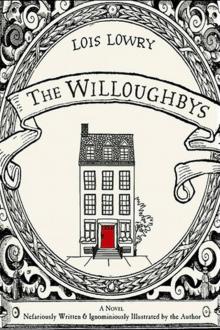 The Willoughbys
The Willoughbys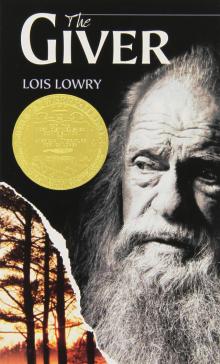 The Giver
The Giver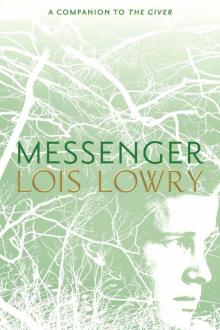 Messenger
Messenger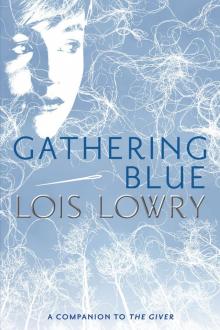 Gathering Blue
Gathering Blue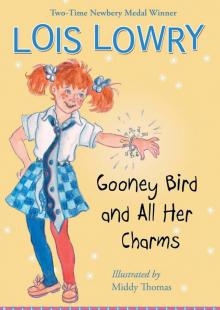 Gooney Bird and All Her Charms
Gooney Bird and All Her Charms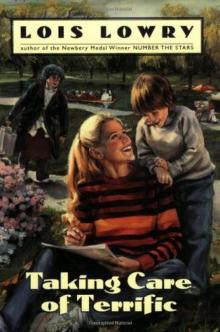 Taking Care of Terrific
Taking Care of Terrific Gooney Bird on the Map
Gooney Bird on the Map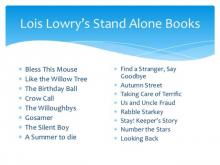 The Birthday Ball
The Birthday Ball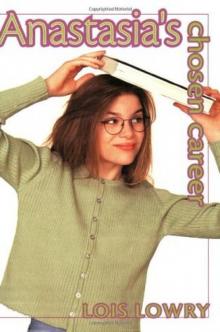 Anastasia's Chosen Career
Anastasia's Chosen Career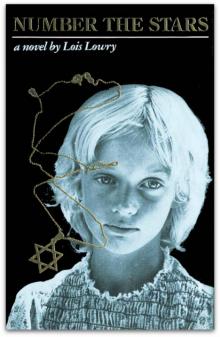 Number the Stars
Number the Stars The Silent Boy
The Silent Boy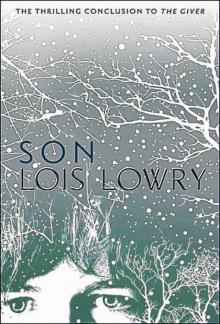 Son
Son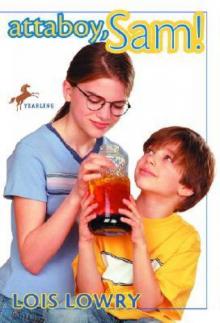 Attaboy, Sam!
Attaboy, Sam!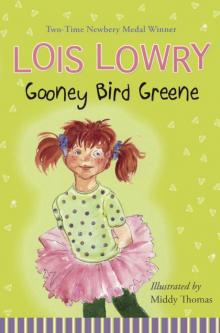 Gooney Bird Greene
Gooney Bird Greene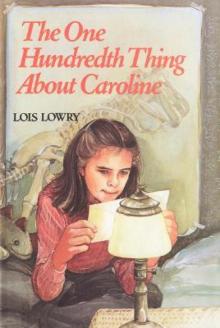 The One Hundredth Thing About Caroline
The One Hundredth Thing About Caroline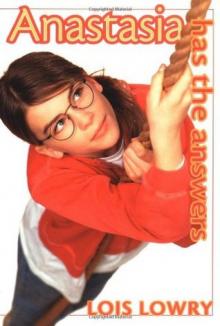 Anastasia Has the Answers
Anastasia Has the Answers Your Move, J. P.!
Your Move, J. P.!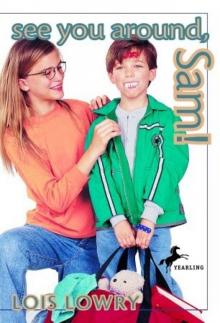 See You Around, Sam!
See You Around, Sam!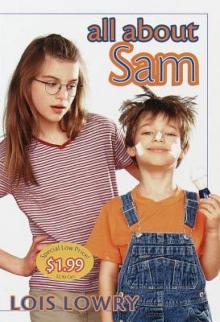 All About Sam
All About Sam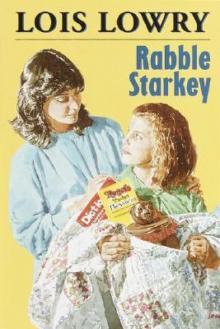 Rabble Starkey
Rabble Starkey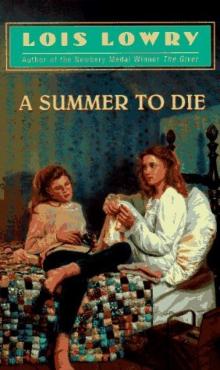 A Summer to Die
A Summer to Die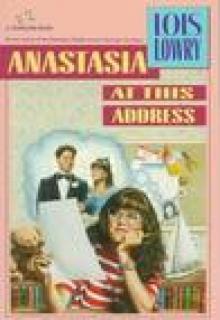 Anastasia at This Address
Anastasia at This Address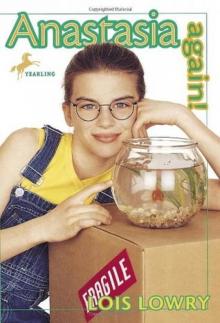 Anastasia Again!
Anastasia Again!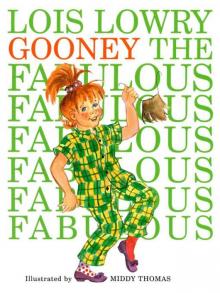 Gooney the Fabulous
Gooney the Fabulous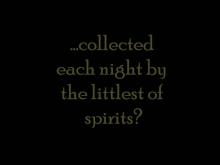 Gossamer
Gossamer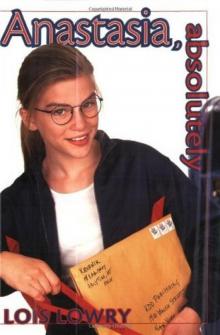 Anastasia, Absolutely
Anastasia, Absolutely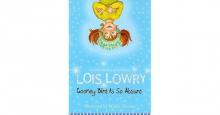 Gooney Bird Is So Absurd
Gooney Bird Is So Absurd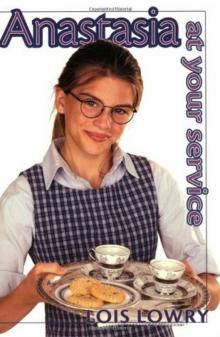 Anastasia at Your Service
Anastasia at Your Service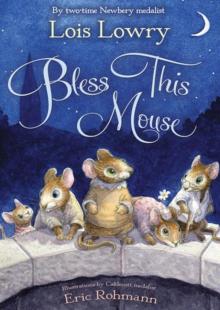 Bless this Mouse
Bless this Mouse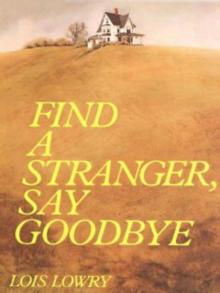 Find a Stranger, Say Goodbye
Find a Stranger, Say Goodbye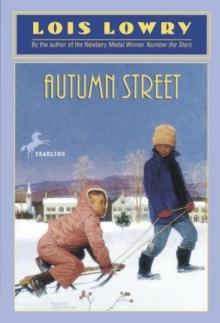 Autumn Street
Autumn Street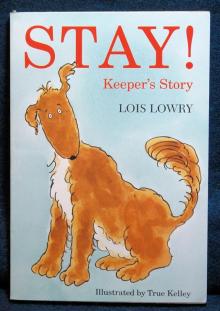 Stay Keepers Story
Stay Keepers Story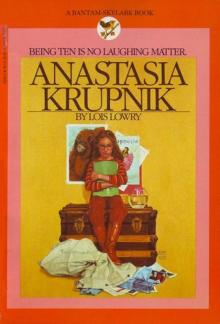 Anastasia Krupnik
Anastasia Krupnik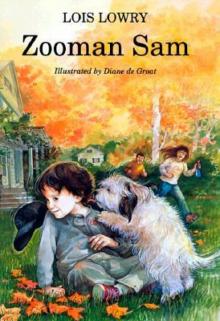 Zooman Sam
Zooman Sam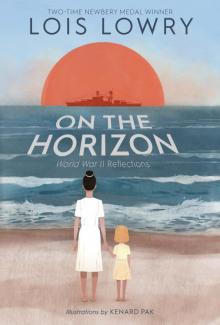 On the Horizon
On the Horizon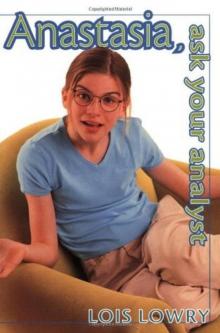 Anastasia, Ask Your Analyst
Anastasia, Ask Your Analyst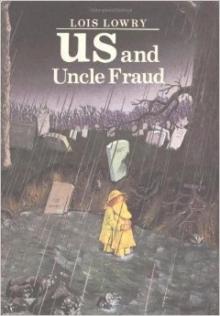 Us and Uncle Fraud
Us and Uncle Fraud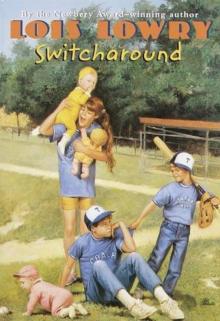 Switcharound
Switcharound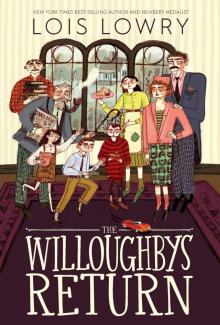 The Willoughbys Return
The Willoughbys Return Dear America: Like the Willow Tree
Dear America: Like the Willow Tree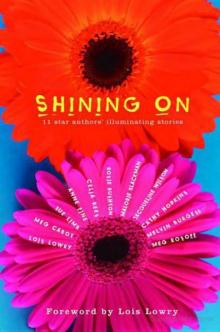 Shining On
Shining On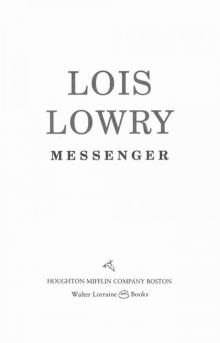 Messenger (The Giver Trilogy)
Messenger (The Giver Trilogy)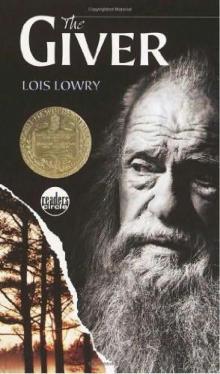 Giver Trilogy 01 - The Giver
Giver Trilogy 01 - The Giver